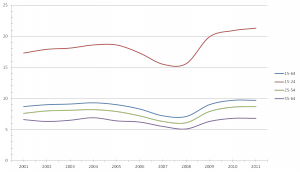A new research project coordinated by IZA experts Werner Eichhorst and Michael Kendzia and commissioned by the EP Committee on Employment and Social Affairs analyzes the impact of the economic crisis on European labor markets, with special attention to the situation of young and old workers. The study shows that while young people in many EU countries have faced severe difficulties in finding jobs, employment rates of prime-aged and older workers have remained remarkably stable (see Figure 1).

On average, youth unemployment rates have increased twice as strongly as the rates of older workers between 2008 and 2011. The study further shows that youth unemployment sky-rocketed in countries (1) where unemployment for older workers also increased strongly, (2) with large construction sectors, (3) that have implemented two-tier reforms of employment protection. In contrast, pension reforms in many EU countries since the 1990s do not seem to have lowered the employment prospects of young people.
In general, there is little evidence of a close substitutability between young and elderly workers. The reason is that young and old workers cannot readily substitute each other in most sectors of the economy, given their different experience levels and skill profiles. Additional empirical evidence from regional labor markets suggests that early exit of elderly workers from the labor market tends to aggravate the labor market outcomes of young individuals. The study concludes that the employment rates for older and younger workers are positively related, tending to converge rather than diverge (see Figure 2). Accordingly, the retention of older workers neither impedes the employment of young workers nor does it increase their unemployment, indicating that there is no competition on the labor market between young and older workers.

The study also suggests ways to solve the European unemployment problem. In order to enhance the functioning of EU labor markets, vocational education and training policies, active labor market policies, and a smooth labor market regulation are of key importance. EU members states should therefore design and implement structural employment-friendly policies that help to stimulate job creation and economic growth. Moreover, a debate on the reforming European benefit systems turning them into re-employment payments should be initiated. In addition to this, EU countries should reform their employment protection legislation. Unbalanced employment protection legislation creates barriers to mobility and discourages the job-to-job or occupational mobility of prime-aged or older workers. Lastly, the experts stress that acquiring and adjusting job-related skills is essential in a dynamically changing economy. This is particularly the case for young people, where initial training and early work experience help to establish a solid employment record. The authors of the report therefore point out that it is necessary to disseminate information about initial vocational education among EU Member States, stressing the need for continuous skill updating and retraining.